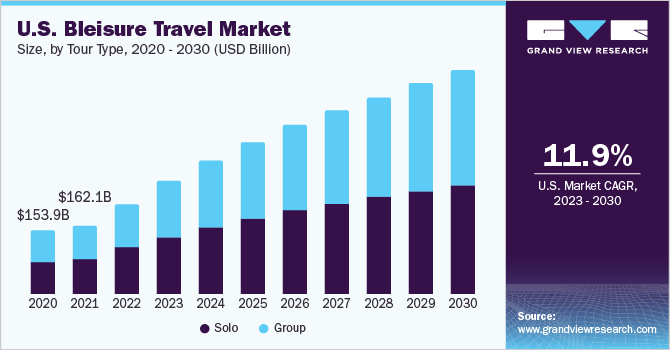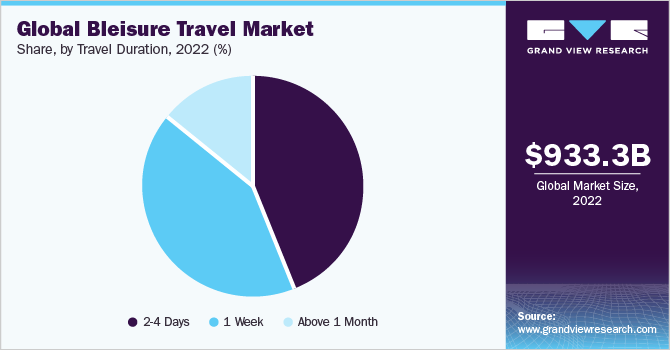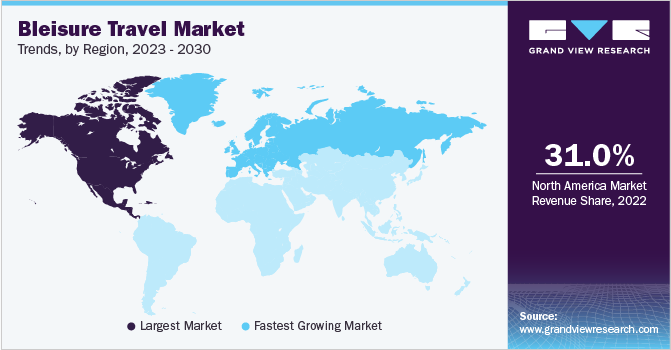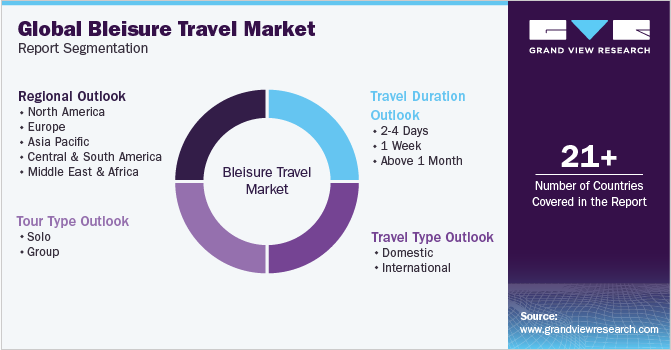
Bleisure Travel Market Size, Share & Trends Analysis Report By Tour Type (Solo, Group), By Travel Type (Domestic, International) By Travel Duration (2-4 Days, 1 Week, Above 1 Month), By Region, And Segment Forecasts, 2023 - 2030
- Report ID: GVR-4-68040-070-8
- Number of Report Pages: 80
- Format: PDF, Horizon Databook
- Historical Range: 2017 - 2021
- Forecast Period: 2023 - 2030
- Industry: Consumer Goods
Bleisure Travel Market Size & Trends
The global bleisure travel market size was valued at USD 933.31 billion in 2022 and is expected to grow at a compound annual growth rate (CAGR) of 12.1% from 2023 to 2030. Bleisure travel is a recent trend where employees mix business visits with leisure travel. The travel business (and workforce) are being entirely spread across up by this trend, which is eventually transforming the nature of work. It gives employees the possibility to extend a business trip's timeline to return by a weekend, a week, or more. According to Expedia Group in 2019, around 50% of travelers desired an extension of the business trips as leisure travel owing to the location of the trip and the offerings in terms of sightseeing, such as historical landmarks. In addition, 56% indicated they would be more likely to contemplate a bleisure trip if the destination provided refreshing cuisine and restaurants. The COVID-19 pandemic resulted in increased work-from-home activities across the globe.

However, employees may have the freedom to work from numerous locations, much like digital nomads, depending on their function and the organization. The distinction between work and personal time has been blurred since numerous companies during the pandemic adopted remote work strategies. Due to the flexibility offered by remote work arrangements, some business travelers are extending their journeys and converting them into vacations. According to a trend listed by Forbes in 2022, 55% of business travelers aim to increase the duration of their business trips post-pandemic to improve work-life balance. This is expected to boost the demand for bleisure travel in the coming years offering service providers an opportunity to expand their portfolio and global outreach.
The pandemic has also highlighted the value of work-life balance because many people must balance their job and personal obligations while working from home. Traveling for pleasure gives people the chance to escape their daily routine, discover new places, and reenergize before going back to work. According to a survey by the Global Business Travel Association of North American business travelers, 79% of respondents stated that their job satisfaction is impacted by their business travel experience.
Bleisure travel offers fresh chances in the hospitality industry and introduces a new kind of traveler: the leisure or business traveler. Hospitality businesses have the opportunity to modify and customize their offerings in light of this novel form of travel. The majority of business and leisure travelers book the same accommodations. As a result, hotels that have historically catered to business travelers now have a chance to show off their relaxing sides, offer wonderful experiences, and win over repeat business. The hotels can entice business travelers with tour packages, pre-planned itineraries, and amenities and services that are specific to the traveling partner and family. For instance, the Hyatt House brand, an American multinational hospitality company offers an extended-stay concept with more than 120 locations worldwide with a focus on business travelers. The company repositions itself in 2022 and launches its most recent campaign, expanding its target market to include leisure consumers.
Online travel agencies provide users with the ability to work remotely from the beautiful location of their choosing. Workation packages are available from travel agencies such as Thomas Cook, MakeMyTrip, Yatra, and many more. Users can select from a wide choice of locations, according to information on their website, that are not only intended to keep visitors secure but also to help them unwind and enjoy leisure while working and attending the meeting in the location. Additionally, the growth of the MICE market across the globe is expected to make a constructive contribution to the market growth.
Tour Type Insights
Solo bleisure travel dominated the market with a share of around 51% in 2022. Traveling has traditionally been seen as a social activity. Achieving a healthy work-life balance can be accomplished quite well through solo leisure travel. It enables people to relax and unwind while continuing to work hard and advance their professions. Travelers are performing an increasing number of duties that require independent work, such as planning trips, keeping track of schedules, making necessary schedule changes, and choosing the overall pace of their journeys. The traveler has complete control over the activities they choose to partake in during this type of trip.
Group bleisure travel is expected to grow at a CAGR of 12.6% from 2023 to 2030. Group vacationers frequently need lodging for bigger groups, which can boost the demand for hotels and other forms of lodging. Travelers frequently eat out together and partake in activities and attractions as a group, generating more business for nearby eateries and tourism businesses. Additionally, as individuals in a group may have various perspectives and origins, traveling in a group can open up possibilities for cultural learning and interaction.
Travel Type Insights
Domestic bleisure travel dominated the market with a share of around 50% in 2022. Due to the lack of lengthy flights, jet lag, and complicated planning, domestic travel is frequently more convenient. Many people are choosing to travel domestically rather than abroad as they become more ecologically conscious and want to minimize their carbon footprint. Governments and tourism organizations are also supporting domestic travel to boost regional economies and domestic tourism.
International bleisure travel is estimated to grow with a CAGR of 11.9% over the forecast period. The growth of international tourism and improvements in transportation infrastructure have made it easier for people to travel to new destinations and explore them in their leisure time. According to Expedia Media Solutions in 2019, people expect full immersion in a new culture when traveling overseas and over long distances. This is expected to boost market growth in the coming years.
Travel Duration Insights
Bleisure travel for 2-4 days dominated the market with a share of around 43% in 2022. According to Stratos in 2022, 31% of travelers opt for bleisure travel for three nights, and 39% of travelers opt for travel for two nights. Many people decide to go on 2- to 4-day leisure vacations to explore their local area and find new activities, restaurants, and sites. Outdoor pursuits like hiking, cycling, or kayaking are frequently included on these quick bleisure holidays, allowing visitors to combine exercise and relaxation.

The bleisure travel for one week is estimated to grow with the fastest CAGR of 12.9% over the forecast period. Bleisure travel for one-week international trips is becoming increasingly popular among business travelers who wish to combine work and leisure. According to Stratos in 2022, 17% of business travelers extend their trip up to a week. With a week to spare, travelers can explore multiple destinations and have more time to relax and enjoy their leisure activities. One week provides ample time to immerse oneself in the local culture, cuisine, and traditions, allowing travelers to gain a deeper understanding and appreciation of the destination.
Regional Insights
North America dominated the bleisure travel market with a share of around 31.0% in 2022. With its diverse landscapes, cultures, and attractions, North America offers numerous options for domestic bleisure travel. Popular destinations include New York City, Los Angeles, San Francisco, and Miami. Advancements in technology have made it easier for bleisure travelers to stay connected and work remotely, allowing them to enjoy leisure activities while still staying on top of their work commitments. According to a survey by the Global Business Travel Association of North American business travelers, 84% of respondents stated that their work travel experiences had an impact on their job performance. While longer trips are still popular, there is also a trend towards shorter bleisure trips in North America, such as weekend getaways or one-day trips.

Europe is expected to witness a CAGR of 13.1% from 2023 to 2030. European countries are relatively close to each other, making it easy for business travelers to combine work and leisure activities in one trip. According to the statistics published by Stratos in 2022, the percentage of business trips that become bleisure travel varies from country to country, the UK bleisure travel accounts for 56 %, and Germany bleisure travel accounts for 65%. For instance, a business traveler in Paris can easily take a train to Amsterdam or Brussels for a weekend getaway. Many European countries place a strong emphasis on work-life balance, with shorter workweeks and more vacation time, which makes it easier for business travelers to take time off for leisure activities.
Key Companies & Market Share Insights
The market for leisure travel is extremely competitive, with many businesses providing various tour types. In order to effectively compete, many major players are focusing the majority of their attention on new tour-type, collaborations, and branching into new markets.
-
In July 2022, BCD Travel partnered with Airbus to serve in major European markets. Through the partnership, the company will provide Airbus with flexible service and a digital approach to enhance the travel experience for its employees. The servicing is available in Germany, France, Spain, and the United Kingdom.
-
In October 2020, BCD Travel extended its partnership with Siemens. Through the partnership, BCD Travel will help in the digitalization of Siemen’s business travel management. The service model offered by BCD Travel help in providing standardized products and services, fulfillment process, and reliable business intelligence from the company’s analytics platform
Some of the key players operating in the global bleisure travel market include:
-
American Express Travel
-
Expedia, Inc.
-
BCD Travel
-
Travel Leaders
-
JTB Business Travel
-
CT Business Travel
-
IMC International
-
AVIAREPS AG
-
Carlson Wagonlit Travel
-
World Travel Holding Inc.
Bleisure Travel Market Report Scope
|
Report Attribute |
Details |
|
Market size value in 2023 |
USD 1,165.33 billion |
|
Revenue forecast in 2030 |
USD 2,333.94 billion |
|
Growth Rate |
CAGR of 12.1% from 2023 to 2030 |
|
Base year for estimation |
2022 |
|
Historical data |
2017 - 2021 |
|
Forecast period |
2023 - 2030 |
|
Quantitative units |
Revenue in USD billion and CAGR from 2023 to 2030 |
|
Report coverage |
Revenue forecast, company ranking, competitive landscape, growth factors, and trends |
|
Segments covered |
Tour type, travel type, travel duration, region |
|
Regional scope |
North America; Europe; Asia Pacific; Central & South America; Middle East & Africa |
|
Country scope |
U.S.; Canada; UK; Germany; France; China; India; Japan; Brazil; South Africa |
|
Key companies profiled |
American Express Travel; Expedia, Inc.; BCD Travel; Travel Leaders; JTB Business Travel; CT Business Travel; IMC International; AVIAREPS AG; Carlson Wagonlit Travel; World Travel Holding Inc. |
|
Customization scope |
Free report customization (equivalent up to 8 analysts working days) with purchase. Addition or alteration to country, regional & segment scope. |
|
Pricing and purchase options |
Avail customized purchase options to meet your exact research needs. Explore purchase options |
Global Bleisure Travel Market Report Segmentation
This report forecasts revenue growth at global, regional & country levels and provides an analysis of the latest trends and opportunities in each of the sub-segments from 2017 to 2030. For this study, Grand View Research has segmented the global bleisure travel market report based on tour type, travel type, travel duration, and region:

-
Tour Type Outlook (Revenue, USD Billion, 2017 - 2030)
-
Solo
-
Group
-
-
Travel Type Outlook (Revenue, USD Billion, 2017 - 2030)
-
Domestic
-
International
-
-
Travel Duration Outlook (Revenue, USD Billion, 2017 - 2030)
-
2-4 Days
-
1 Week
-
Above 1 Month
-
-
Regional Outlook (Revenue, USD Billion, 2017 - 2030)
-
North America
-
U.S.
-
Canada
-
-
Europe
-
UK
-
Germany
-
France
-
-
Asia Pacific
-
China
-
India
-
Japan
-
-
Central & South America (CSA)
-
Brazil
-
-
Middle East & Africa (MEA)
-
South Africa
-
-
Frequently Asked Questions About This Report
b. The bleisure travel market was estimated at USD 933.31 billion in 2022 and is expected to reach USD 1,165.33 billion in 2023.
b. The bleisure travel market is expected to grow at a compound annual growth rate of 12.1% from 2022 to 2030 to reach USD 2,333.94 billion by 2030.
b. North America dominated the bleisure travel market with a share of 31.21% in 2022. The growth of the regional market is mainly driven by the growing trend of work-from-home and flexible working and ethical & sustainable travel practices by leading tour operators in the region.
b. Some of the key players operating in the bleisure travel market include American Express Travel, Expedia, Inc., BCD Travel, Travel Leaders, JTB Business Travel, CT Business Travel, IMC International, AVIAREPS AG, Carlson Wagonlit Travel, and World Travel Holding Inc.
b. Key factors that are driving the bleisure travel market growth include the desire for a better work-life balance, a way to attract and retain top talent in the companies, and a growing number of travelers looking for unique and personalized experiences.
We are committed towards customer satisfaction, and quality service.
"The quality of research they have done for us has been excellent."




